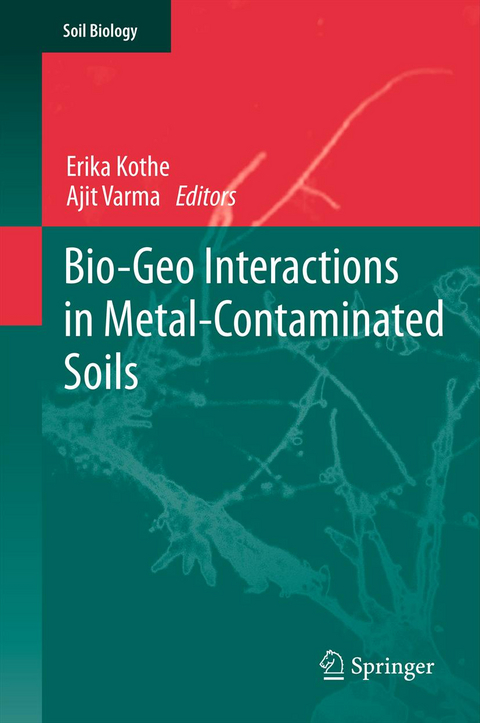
Bio-Geo Interactions in Metal-Contaminated Soils
Springer Berlin (Verlag)
978-3-642-42735-0 (ISBN)
Metal contamination is an increasing ecological and eco-toxicological risk. Understanding the processes involved in metal mobilization, sorption and mineralization in soils are key features for soil bioremediation.
Following an introduction to the physical, chemical and biological components of contaminated soils, various chapters address the interactions of soil, microorganisms, plants and the water phase necessary to transfer metals into biological systems. These include topics such as potential hazards at mining sites; rare earth elements in biotic and abiotic acidic systems; manganese redox reactions; biomineralisation, uranium in seepage water; metal-resistant streptomycetes; mycorrhiza in re-forestation; metal (hyper)accummulation in plants; microbial metal uptake; and their potential for bioremediation.
This book will be of interest to soil biologists, geologists and chemists, researchers and graduate students, as well as consulting companies and small enterprises involved in bioremediation.
Contaminated Soil: Physical, Chemical and Biological Components.- Biogeosciences in Heavy Metal Contaminated Soils.- The Role of Mineralogy and Geochemistry in Hazard Potential Assessment of Mining Areas.- Rare Earth Elements in Biotic and Abiotic Acidic Systems.- Geomicrobial Manganese Redox Reactions in Metal Contaminated Soil Substrates.- Natural Biomineralization in the Contaminated Sediment-Water System at the Ingurtosu Abandoned Mine.- Speciation of Uranium in Seepage Water and Pore Water of Heavy Metal Contaminated Soil.- Plant microbe interaction in heavy metal contaminated soils.- Heavy Metal Resistant Streptomycetes in Soil.- Role of Mycorrhiza in Re-Forestation at Heavy Metal Contaminated Sites.- Historical Copper Spoil Heaps in Salzburg/Austria: Geology, Mining History, Aspects of Soil Chemistry and Vegetation.- Natural Vegetation, Metal Accumulation and Tolerance in Plants Growing on Heavy Metal Rich Soils.- Hyperaccummulation: a Key to Heavy Metal Bioremediation.- Nickel Hyperaccumulating plants and Alyssum bertolonii: Model Systems for Studying Biogeochemical Interactions in Serpentine Soils.- The Role of Organic Matter in the Mobility of Metals in Contaminated Catchments.- Mycorrhizal-Based Phytostabilization of Zn-Pb Tailings: Lessons from the Trzebionka Mining Works (Southern Poland).- Bioremediation of Copper, Chromium and Cadmium by Actinomycetes from Contaminated Soils.- Bioremediation and heavy metal uptake: microbial approaches at field scale.- Contributions to the Theoretical Foundations of Integrated Modeling in Biogeochemistry and their Application in Contaminated Areas.
| Erscheint lt. Verlag | 23.2.2014 |
|---|---|
| Reihe/Serie | Soil Biology |
| Zusatzinfo | XIV, 426 p. |
| Verlagsort | Berlin |
| Sprache | englisch |
| Maße | 155 x 235 mm |
| Gewicht | 670 g |
| Themenwelt | Naturwissenschaften ► Biologie ► Mikrobiologie / Immunologie |
| Schlagworte | bioremediation • Heavy metal contaminated soils • Metal hyperaccummulation • Plant metal accumulation • Polluted mining sites • Soil Pollution |
| ISBN-10 | 3-642-42735-9 / 3642427359 |
| ISBN-13 | 978-3-642-42735-0 / 9783642427350 |
| Zustand | Neuware |
| Haben Sie eine Frage zum Produkt? |
aus dem Bereich


